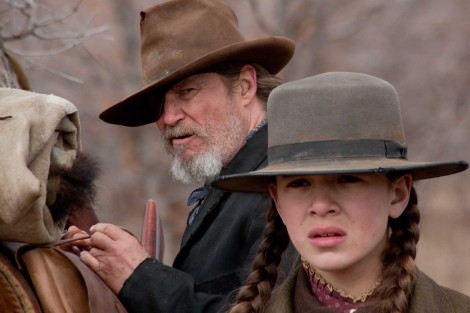
True Grit is a big hit for the Coen brothers, giving them their best opening weekend ever. Their growing popularity cues two inevitable reactions:
1) the claim that they’re improving as filmmakers, finally learning how to do it right, “it” being the tired sentimental humanism that goes over so big with so many dopes; and
2) the claim that they’ve sold out, abandoned their dazzling formalism, lost their satirical mojo, and degenerated into sinful conformity.
Of these two positions the first is by far the dumber and more common; I just had it solemnly presented to me by a bearded academic at a Christmas party, which is a lesson to me to stay in lockdown over the holidays.
The second position represents a more legitimate worry when watching True Grit: it looks plain and straightforward, it’s PG rated, it’s emphasizing the children’s-adventure aspects of the material—it seems, God help us, to have been made into safe viewing for kids.
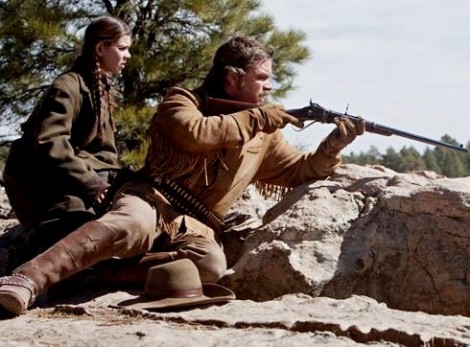
But this film is just a variation on business as usual for the Coens. It’s very much in keeping with the Coen policy of turning out great, rich, bloodsome stuff in a casual or even stealthy way, without much pomp or clamor. Partly because of this greatness-by-stealth-policy, a lot of people are only just recently catching on to the Coens. Right around No Country for Old Men time, critics sat up from their long naps, shook their blocky heads and said, in the cadences of The Far Side’s cavemen, “Hey! Look what Coens do! Them make movies good from books!”
See, the Coens started adapting books around 2007, and that’a really helped a lot of critics appreciate them at long last, only twenty-some years after they started making great films. Because most critics have high-culture hang-ups that should’ve died out sixty years ago but persist among a sad retrograde sliver of the population, they get all hot for Literature, so film adaptations of works by pre-approved authors like Cormac McCarthy have made them reconsider the Coens. True Grit, based on the stark, grim, and deeply funny 1968 novel by Charles Portis, is generally getting high praise. (A 94% rating on Rotten Tomatoes, in the parlance of our time.) The praise itself is wrongheaded in all particulars, but still.
For example, David Edelstein of NPR starts off his review as fatheadedly as possible:
Joel and Ethan Coen are probably tired of the question, but you can’t not ask it: Why make a film of Charles Portis’ 1968 novel True Grit when it already was a movie — a good one — with a definitive, Oscar-winning performance by John Wayne as one-eyed U.S. Marshal Reuben “Rooster” Cogburn?
You see? Idiocy right off the bat. The 1969 movie version of True Grit was not a good movie, and there was nothing definitive about John Wayne’s performance of the “Rooster” Cogburn character. The best you can say about the 1969 version was that John Wayne seemed to be enjoying himself hamming it up with the eyepatch and all, and I suppose getting an Oscar for it was a nice treat for him before he died of the Big C.
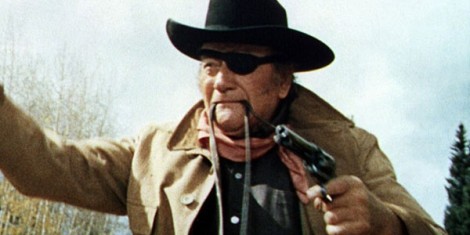
Otherwise it was about as moldy and clueless an entertainment as was ever made; even when new it seemed to have been designed for doddering denizens of old folks’ homes, something to run on the lounge TV and cast a vague, comforting, nostalgic glow for the terminally checked-out. The appalling Kim Darby as Mattie Ross was an insult to any intelligence above an earthworm’s, and on top of that there was Glen Campbell as Texas Ranger LaBoeuf—yeah, that’s right, the “Wichita Lineman” singer taking a shot at acting, sorta like Ricky Nelson did alongside John Wayne in Rio Bravo back in the dear old days of yore.
The whole thing was a forgettable mess, and I wouldn’t have brought it up at all if most of the critics hadn’t harped on it in reviewing the Coens’ True Grit. All of a sudden everybody’s an expert on “the original” movie, set on comparing John Wayne’s Cogburn to Jeff Bridges’. A lot of feeble wordplay about “the Duke versus the Dude” has broken out, reminding me that most critics are probably senior citizens themselves by now, just about ready to retire and commence drooling in front of the TV in the lounge.
Never mind. It doesn’t really matter.
The important thing is, the Coens’ True Grit is very funny, and very serious, at the same time. This is a specialty of theirs, though it’s sailed clean over the heads of legions of filmgoing morons for ages. People have trouble with complexity: if the Coens are funny, they can’t also be serious, and if they can’t be serious, they’re mere postmodern pranksters making fun of everything, and ought to be squelched somehow.
In author Charles Portis, the Coens have met their match and then some, because much of Portis’ humor is so hard and dry and unpandering, it’s like rock strata embedded in harsh cliffs and if you miss it, that’s tough. The Coens actually make it seem much showier; some lines play so raucously they send you flying back to the book to see if they could really be in there. And they are.
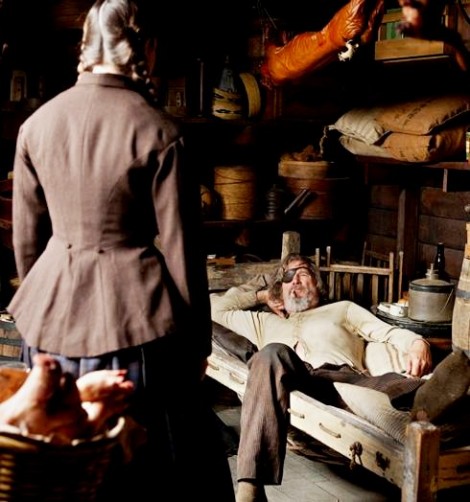
Take the courtroom scene where fourteen-year-old Mattie Ross first spies Reuben “Rooster” Cogburn, and decides he has the “true grit” to hunt down her father’s killer. Cogburn is defending himself against the cross-examining attorney’s suggestion that his high-casualty gusto when capturing criminals is open to criticism. The Coens’ cinematographer Roger Deakins shoots his slouching bulk in a halo of pale smoky light cast through a dirty window, which is about as apt an image of rough justice personified as can be achieved in film.
In the book, Mattie records the cross-examination of Cogburn by quoting directly from the court transcript, for she is much addicted to documentation:
MR. GOUDY: …I believe you testified that you backed away from Aaron Wharton.
MR. COGBURN: That is right.
MR. GOUDY: You were backing away?
MR. COGBURN: Yes sir. He had that ax raised.
MR. GOUDY: Which direction were you going?
MR. COGBURN: I always go backwards when I am backing up.
MR. GOUDY: I appreciate the humor of that remark.
If the Coens aren’t totally faithful to that bone-dry exchange, they are damn close, and yet in the film it plays big, vivid, and funny, with gravel-voiced, greasy-haired Cogburn savoring his own wit (foolishly, because the lawyer is about to trip him up) and how well his punch-line goes over with the boys in the gallery, and Mattie watching him with growing exultation in having found the ideal Tom Chaney-hunter. Same events, same dialogue, remarkably different impact.
This is not to say that the Coens are strictly faithful to the letter, or the spirit, of Portis, even if such a thing were possible. They’re not. This will cause a good deal of pain to those truly dedicated to Portis—just ask John Dolan, who writhed in agony at the many infidelities. Dolan’s got some good objections to the changes: villains not mean and scary enough; most of the important business with the Indians who nominally run the territory is cut; LaBoeuf keeps abandoning the little posse in a huff and then returning cheesily in the nick of time; and there’s no sense that Mattie’s starched, no-contractions narration is censoring the other characters’ casually profane language and disgusting behavior.
Plus, what’s the deal with the guy in the bear suit? That scene’s not in the book, and it doesn’t work at all, either.
On the other hand, most people who’ve read the book won’t remember it in anything like Dolan-detail. In fact, I’ve come across long critical essays about how marvelously faithful the film is to the book, and how much the Coens have benefitted from relying on Portis’ superior artistry.
Regardless of how faithful or unfaithful they are to Portis, the question is, what exactly are the Coens doing with the material? Being the Coens, they’ve naturally stressed the humor, dug it out of the cliff face and shoved it forward. They’ve made such a coxcomb out of Matt Damon’s overconfident Texas Ranger LaBoeuf (pronounced by everyone as LaBeef) that he’s right up to the edge of cartoonish, and Damon clearly relishes it, clanking around in his showy spurs and buckskins and curled mustache, vying absurdly with Bridges’ Cogburn for Mattie’s admiration.
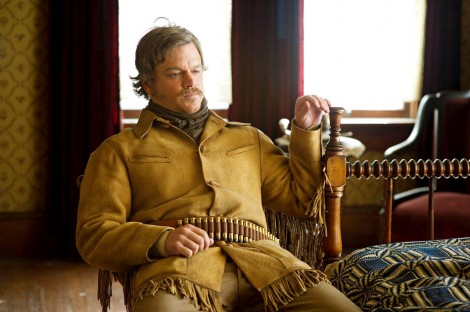
And Bridges wrings the juice out of every aspect of Cogburn, formidable and seedy in equal measure. His scene target-shooting at empty whiskey flasks and “corn-dodgers” while flailing drunk is a thing of beauty and a joy forever.
By laying such emphasis on humor the Coens have risked weakening the vital context of the post-Civil War border states and territories where human perfidy flourishes and harsh consequences are guaranteed one way or another. They rely on the power of stark imagery to keep present the sense of hard ground, cold nights, bad food, tired bones, prevalent danger.
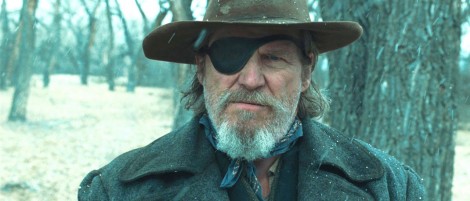
The Coens have also opted to accentuate what must be more apparent anyway, as we watch the film, than it could possibly be in the book: we’re looking at a fourteen-year-old girl in tight braids who is evidently, as well as legally, still a child, though she’s achieved an almost freakish command of horse-trading and legalese. As we read the book, the sense of Mattie as an early-adolescent girl gets blurred by her own adult voice narrating the tale as well as her acceptance into remarkably rough adult company. No such thing is possible in the film, if you preserve that specific age in casting the actress playing Mattie; there she is, a fourteen-year-old girl, played by fourteen-year old (Hailee Steinfeld), surrounded by tough customers. When such a girl is filmed fording a fast river on horseback, her head and the pony’s both struggling to keep above water, it has a heart-gripping impact the book can’t have, and that changes things.
The Coens embrace the material as a kind of children’s adventure tale, with an American Gothic somberness not typical of that subgenre. They’ve drawn inspiration from another source than Portis’ novel: a weird old 1955 film called Night of the Hunter, which is the only American Gothic children’s adventure-slash-fairy tale ever committed to film, as far as I know.
The Coens take the Night of the Hunter theme song, the old evangelical hymn “Leaning on the Everlasting Arms,” and weave it through the True Grit in instrumental form before finally breaking out vocally at the end, using Iris DeMent’s wailing roots-music version. This series of music cues indicates the structure of affect the Coens are going for, which is an almost shocking burst of emotion at the finale, after long restraint. This is not Portis’ way. The Coens repeat similar incidents in different tones, first comical and light, then later, dark and heavy. LaBeef bids Mattie “Ay-dios!” twice, in opposing registers, and we’re meant to feel the accumulated weight that’s the difference between the two. Cogburn saves a mule from casual tormenters armed with sticks in a humorous scene early on, then later rides a horse to its awful death, jabbing it in the haunch with a knife.
What begins comically, with overbearingly competent Mattie’s hiring adult help that she can’t get any other way (“my mother is indecisive and hampered by grief”), accrues poignancy as peril increases and adults fail. The repeated abandonments by LaBeef, and the Cogburn feet-of-clay scene—nowhere present in the Portis novel—seem to owe more to the Night of the Hunter structure than to Portis. Night of the Hunter is about imperiled children in a world of adults mired in various states of sin and frailty who are helpless to defend them against actual evil, and the one boy who knows he’s hopelessly overmatched and sets out to on a desperate journey to get adult help for himself and his sister.
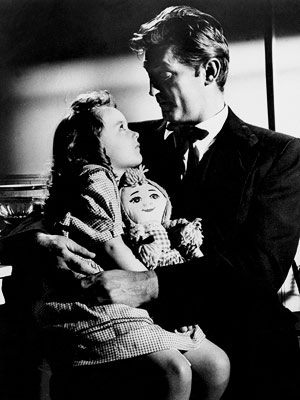
Evil in Night of the Hunter is chiefly represented by the depraved killer Harry Powell (played by Robert Mitchum, a character based on an actual Depression-era widow-murderer Harry Powers) who fancies himself a preacher in a sadistic religion “God and I worked out betwixt ourselves.” He duels morally, musically, and the usual way, with guns, against Lillian Gish as the embattled representative of stringent Protestant and maternal virtue. During an armed stand-off they sing at each other, melody versus harmony, their rival versions of the old “Leaning” hymn, and it’s every bit as crazy as it sounds, but eerie and moving as well.
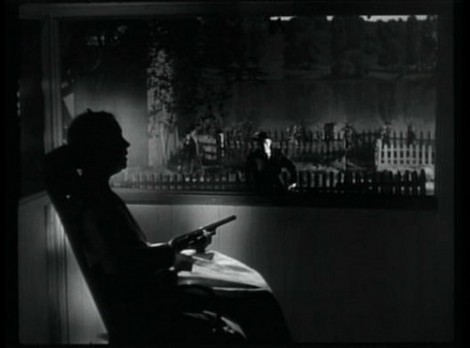
The Coens’ evocation of that much more plaintive film is held in check until the harsh consequences begin to accumulate toward the end of True Grit. Then they let it loose aurally and visually, and the parallel between the films gets clearer: during Cogburn’s climactic night ride to save Mattie, the landscape takes a hallucinatory beauty of black silhouettes against starry horizons that’s modeled on the children’s dreamlike escape downriver in Night of the Hunter.
Mattie’s final pronouncement in True Grit remains spare: “Life just gets away from us.” In that way it’s unlike Night of the Hunter, which ends with Lillian Gish making a long speech to the camera about how children are God’s creatures because they “abide.” (That’s the inspiration for the phrase “the Dude abides” in The Big Lebowski. The Coens draw on Night of the Hunter pretty regularly.) But both endings are intended to wreck you. The persistent crock about how the Coens are cold filmmakers was always stupid, but now it’s outright insane. If anything, they’re so determined to have an annihilating emotional impact in their recent films—No Country for Old Men, A Serious Man, and now True Grit—they’re in danger of overbalancing and producing something really grotesque if they’re not careful.
Obviously, you don’t need to know anything about Night of the Hunter in order to feel the impact of its influence in True Grit. And most people who enjoy True Grit don’t find it all that emotional, either. They say it’s a “pretty good Western” and crazy stuff like that that doesn’t mean anything.
I’ve come to realize that’s because the Coen brothers make films for me, more or less exclusively. The Coens don’t know this, of course. I just happen to be the perfect audience for their films, and though other people stumble into theaters and watch their stuff and even like some of it, they like it without really appreciating it to its fullest extent. It’s all perfectly calibrated for ME, see, and that leaves the rest of you kind of out in the cold, Coen-wise. Harsh, but that’s how it is.
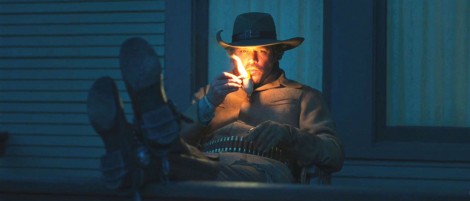
Read more: Charles Portis, Coen brothers, film, Jeff Bridges, John Wayne, Matt Damon, Night of the Hunter, True Grit, Western, Eileen Jones, movies


Got something to say to us? Then send us a letter.
Want us to stick around? Donate to The eXiled.
Twitter twerps can follow us at twitter.com/exiledonline





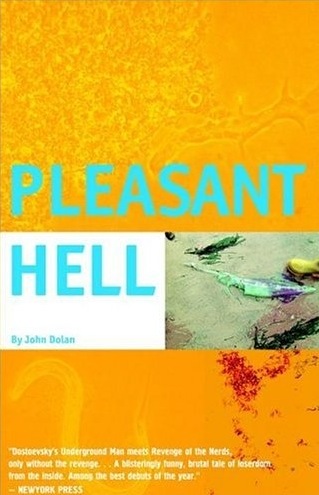









45 Comments
Add your own1. yosemite | December 28th, 2010 at 4:45 am
How obsequious. Lets not forget Hudsucker Proxy which did suck…. and O brother which was torturously bad… and others… they’re good … but they still make plenty of shit
2. William | December 28th, 2010 at 9:18 am
Nice takedown of Wayne and the first movie version. Excellent review. Hilarious last paragraph.
3. mydick | December 28th, 2010 at 9:37 am
They make them for me too.
A Serious Man was one of the greatest movies of all time. True Grit was great- but I feel like the Coen Brothers could have taken more risks considering how amazingly talented they are.
4. John Drinkwater | December 28th, 2010 at 11:46 am
Next to the absolute classic Lebowski, True Grit is now my second favorite Coen bros movie. Scene at the end with the snakes and then Cogburn desperately riding the girl back to safety was, like, powerful, man. I hated A Serious Man, thought No Country was good but overrated. Miller’s Crossing? Mediocre. Burn After Reading was pretty funny and smart but nothing to write home about.
5. maus | December 28th, 2010 at 1:11 pm
“That’s the inspiration for the phrase “the Dude abides” in The Big Lebowski. The Coens draw on Night of the Hunter pretty regularly.”
I feel so dumb for not making this connection.
6. vortexgods | December 28th, 2010 at 1:33 pm
I love Night of the Hunter. I only watched it recently, but it’s a brilliant film. It has an oddly modern sensibility.
So brilliant, in fact, that Charles Laughton was never allowed to direct another one.
Hollywood hates it when you fly that close to the Sun.
7. hamsterfist | December 28th, 2010 at 3:40 pm
You must live in an area full of idiots. The audience (a mixture of old people and hipsters) laughed at the appropriate time and were all ‘hushed’ at the end. Getting old is hell and I walked out of the theater in a haze as True Grit grabbed me, sucked me in, then punched me in the face with emotion. Pure genius and it made me want to burn the homes of my MORON friends who would rather see Tron or Little Fockers.
8. MassWasting | December 28th, 2010 at 4:02 pm
When I was a very young Star Wars fan I developed a habit of reading the “movie books” of recent films such as, obviously Star Wars, and less obviously, Logan’s Run (our small, Montana town librarian, who studied at the Somme, suggested that I not read Logan’s Run: he was right). In this process, without realizing which came first, the movie or the book, I also read Portis’s True Grit and was deeply disturbed. This was not John Wayne, and this was much funnier and had much more “going on” in it than I was ready to comprehend. I have not re-read the Portis novel and probably will not before I see the Coen’s film version. Regardless, I am glad they have filmed the book and I’m glad this review was written–by far the most coherent review so far.
I can claim (with whatever ballast that holds with online comment threads) that I understood the relationship of Night of the Hunter with the Coen Bros.’s body of work (great studio name!). I would argue that the Coen’s fascination is with Mitchum over Laughton. Watch John Huston’s Heaven Knows Mr. Allison as a possible support for my claim.
Eileen Jones: keep doing considering what you consider.
9. Goat_farmers_of_the_CIA | December 28th, 2010 at 4:17 pm
@John Drinkwater
What makes you say that Miller’s Crossing was mediocre? I thought it was brilliant. Just like every other good film of the Coen’s, it was funny, but not at all silly – I still think about the characters, their personality and the things they did. What Byrne’s character says about hats (“nothing more pathetic than a man running after…”), plus the operatic scene with the mob boss killing the hitmen at his burning house, to the tune of an Irish folk song – just these two are worth the price of admission (at an arthouse retrospective, that is).
10. Mason C | December 28th, 2010 at 4:23 pm
Jones once again proves herself by ably showing the difference between crap (and crap vendors) and art. I’m so glad the Coens re-made this one. I never could watch all of the ’69 version because John Wayne was such a tool.
Sure, the Coens have made some duds, but they also own several of the unquestionably great films of the last 25 years. People who don’t get what they’re up to are the moviegoing equivalent of wearing the matching t-shirt, baseball cap, and 5″ button that read ‘I’m a moron’ — comparable watching Dead Man Walking and complaining “there’s no story” or seriously discussing the oeuvre of Jerry Bruckheimer.
11. CensusLouie | December 28th, 2010 at 10:34 pm
Bad Cohen Bros movies and no one’s mentioning The Lady Killers?
I’m just going to say it: John Wayne is the most overrated actor in American movie history. Not an ounce of nuance or character on him, just a languid drawling that propelled him to being an icon in the eyes of the same people who worship Reagan.
12. Nick | December 28th, 2010 at 10:55 pm
The last paragraph helps me a lot. I never liked the coen brothers that much even though I was supposed to and lots of smart people I know love them. But i have always thought that herzog genuinely makes movies for just me, so i get it now.
13. John Drinkwater | December 28th, 2010 at 11:31 pm
@Goat_farmers_of_the_CIA
I guess it’s just a matter of taste. I didn’t care for the movie back then, and I watched it again the other night just in case…but I still didn’t like it. Aside from the characters constantly drinking, I have no idea what the appeal to this movie is.
14. boson | December 29th, 2010 at 8:00 am
“I’ve come to realize that’s because the Coen brothers make films for me, more or less exclusively. The Coens don’t know this, of course. I just happen to be the perfect audience for their films, and though other people stumble into theaters and watch their stuff and even like some of it, they like it without really appreciating it to its fullest extent.”
funny. i had the very same thoughz after most pof their films.
15. 4r328uju8 | December 29th, 2010 at 5:15 pm
I hope this doesn’t mean westerns are being resurrected as a genre. The only genre worse than westerns was 3D. And I hope G0D smites the current 3D practitioners like they deserve.
“high-casualty gusto when capturing criminals” A hero for our times.
16. Neil Templeton | December 29th, 2010 at 5:37 pm
Excellent photo at the top of your piece. That kid hasn’t had lip surgery, has she?
17. Flatulissimo | December 29th, 2010 at 6:43 pm
Funny how everybody has different ideas of which ones are the “good” Coen films. I hope we can all agree that the Ladykillers was the worst of the worst, though. Probably it gets mentioned less because Coen fans are trying to forget that it happened.
I also thought O Brother was pretty mediocre, and the soundtrack is any easy way to find out if someone has no taste in music. If they claim they love the NPR-friendly “country” on the O Brother soundtrack, they probably have a copy of the cd on the shelf next to Norah Jones and Patty Griffin, and its a safe bet that you should avoid any discussion of music with such people. The O Brother soundtrack = musical Shawshank Redemption.
Glad to see Eileen buck the usual critical line regarding the original True Grit. I had never seen it, and watched it recently in anticipation of the Coen’s version. It looked like an episode of Bonanza, and was about as exciting. Frankly it made me wonder what the Coens are up to in re-making it, because it didn’t seem worth their time. I can grudgingly concede that The Searchers is watchable (in a take-your-medicine kinda way), but True Grit was made over a decade later and is so hokey, and looks so dodgy, it seems like it must be the older film instead.
18. Fissile | December 29th, 2010 at 8:34 pm
@CensusLouie, It’s true that John Wayne appeared in a lot of shit films…his personal political beliefs were nothing to admire either, but Wayne was not quite as dumb, or one dimensional, as you believe. Have a look at The Searchers, a film that deals with the topics of racism, genocide, rape and revenge. Not topics that were normally discussed in mainstream movies during the 1950’s. Stagecoach was a favorite of Orson Welles. Wayne starred in, and produced, Angel and the Badman, a story about a man who comes to the realization that you can’t solve all your problems by shooting people in the face. Sergio Leone, one of the best Western directors ever, greatly admired The Man Who Shot Liberty Valance. Yes, the Wayne version of True Grit sucked something powerful, but credit where credit is due, please.
19. adimo | December 29th, 2010 at 8:39 pm
I just saw True Grit and immediately realized they were taking on Night of the Hunter as an inspiration (one of my favorite films) Thanks for pointing out in depth all the pertinent references, especially the horse ride through the night, which, after you point it out, seems so obvious, but went by so fast and it is a highly emotional moment in the film. Great to connect with a like mind.
20. CensusLouie | December 30th, 2010 at 1:07 am
@18
For every person that remembers Wayne for those movies, there are 50 who eat up his generic westerns, detestable crap like Green Berets, and walk around calling him “The Duke”.
That’s what I meant by most overrated; everyone loving him for all the wrong reasons.
21. Fissile | December 30th, 2010 at 10:55 am
@CensusLouie 20, That’s how it’s always been with movies, music, painting, whatever. How many mafioso wannabes were walking around giving each other the kiss of death after they saw the original Godfather? How many people were inspired to join the military after seeing Apocalypse Now, one of the greatest ANTI-WAR
22. Fissile | December 30th, 2010 at 10:58 am
@CensusLouie 20, That’s how it’s always been with movies, music, painting, whatever. How many mafioso wannabes were walking around giving each other the kiss of death after they saw the original Godfather? How many people were inspired to join the military after seeing Apocalypse Now, one of the greatest ANTI-WAR movies ever made? Because fuck-wits (the majority of people in all societies) can’t interpret the message, or separate fact from fantasy, does that mean people like Coppola, Brando, Duval are scumbags?
23. korman643 | December 30th, 2010 at 12:18 pm
@Fissile: Apocalypse Now, one of the greatest ANTI-WAR movies ever made?
Apocalypse Now is not anti war, by any means – it’s a love valentine to the Vietnam War made by people who did all what was in their power to avoid it, just to discover (when all was over) that they regretted missing the show. I believe Dolan wrote this some time ago, but the point was originally made by Gus Hasford, the author of “Short Timers” (the novel that originated “Full Metal Jacket”) back in 1986. And to be honest, that what I thought when I saw the movie first in 1980.
I can see it by yourself – check again the Ride of the Valkyrie scene and see in all honesty if you don’t think “wow, that’s exciting, I wish I could have been there”.
24. GARY | December 30th, 2010 at 1:34 pm
the original true grit was so bad it was good…no country for old men had a good first half but had no ending..the movie lagged(was tommy jones asleep?)when bardem was off camera…oh brother was the best and if you didn’t like the music you have been listening to too much lady gaga
25. matt | December 30th, 2010 at 5:37 pm
This review popped up on alternet. Reading the comments was fuckin funny. I mean the people that commented on the review are such pompous twats. Some of them couldn’t even get the reviewers name right, and others stuck to the usual “some people just like different things so who needs criticism” line. Oh and if you don’t like John Wayne in True Grit it’s because you’re just not old enough to appreciate his genius.
The more I read the exiled the more I realize just how shit everyone else is.
26. jefsof-2 | December 30th, 2010 at 9:21 pm
Eileen writes clever reviews – she’s fun to read. My review is the only correct one for A Serious Man (link below and through name) … I get it way more than Eileen does:
http://www.imdb.com/title/tt1019452/usercomments?start=160
27. Perry Glasser | December 31st, 2010 at 7:03 am
The original True Grit had flaws–as does this new version. Fans will note that the Coen brothers have moved the eyepatch from Wayne’s left eye to Bridges’ right.
The Coen’s do not know what to do with the idea of “heroism,” living in a post-modernist culture where cynicism is equated with sophistication. Bridges plays the lead very well, but Wayne was an archetype, and by the time he played Marchall Cogburn was the only actor who could do that, not out of any amazing talent, but because of his long legacy as a journeyman western hero and the connection in the audience’s mind that equated Wayne with “Americanism.”
Criticizing Wayne’s original perfomance because of his personal politics is like rejecting Ezra Pound’s poetry because he was a fascist, somewhat off point.
The Coen version ends with a tired contemporary cliche of a dissolve to an older person who recollects the action for us–awkwardly imposed on the film as no such character is hinted at in the opening. The Coens simply had no ending, and fell back to faux memoir. Compare to the original that ends with a freeze frame of Wayne: “Well, come see a fat old man sometime!” as his horse leaps a fence, the camera shooting from the ground up, making Wayne larger than life–which he was. Complaining that Wayne was not a great actor ignores the fact that he was a great icon, used by Howard Hawks and John Ford: anyone who can write mention Wayne without mentioning The Searchers, She Wore a Yellow Ribbon, Stagecoach, and The Man Who Shot Libery Valence is either ignorant of film history or loading the case to make a self-evident point, but doing so dishonestly.
So the Coens give us a sigh that means “paths of glory lead but to the grave,” a pretty limp emotional point, but in the original we see the larger-than-life image of a dissolute, ageing, principled loner whose courage and grit in a lawless territory respects a 14-year-old girl he comes to call “little sister” because she too has grit. Pointedly, the Coen brothers omit the dialogue by Wayne, “She reminds me of me,” uttered when Mattie swims the river into Choctaw territory, fearlessly leaving law and order behind. The famous jousting scene in both films is observed by Mattie from a height and distance, but in the original Mattie excitedly says, “True grit? I’ll say!” but in the Coen brothers version she may as well be in the cheap seats at an NBA game.
At issue in the original is courage and heroism, virtues that contemporary audiences distrust because those virtues require certainty, and post-modernists sensibilities would have us believe that the only certainty is that there is no certainty. This is a perspective that sounds terribly profound and makes great cocktail party conversation for men in black corduroy jackets, but when generally accepted leaves a culture unable to identify evil.
28. Marion Morrison | December 31st, 2010 at 9:56 pm
True Grit, the original…is ONE OF WAYNE’s best films; there are others which are probably better, however in the long run the film is pretty damn good.
But of course, I also liked and will praise his GREEN BERETS film too.
Perhaps you should be less of a film CRITIC and go out there and do your own movies, and prove just how good YOU can be as a director.
29. tam | January 1st, 2011 at 4:29 am
Good article but the Coens have basically been doing adaptations for ages. Blood Simple is a homage to James M Cain, Miller’s Crossing is Dashiell Hammett and The Big Lebowski is Raymond Chandler. The only difference these days is that they’re being more open about it.
30. maus | January 1st, 2011 at 3:35 pm
“The Coen’s do not know what to do with the idea of “heroism,” living in a post-modernist culture where cynicism is equated with sophistication. Bridges plays the lead very well, but Wayne was an archetype, and by the time he played Marchall Cogburn was the only actor who could do that, not out of any amazing talent, but because of his long legacy as a journeyman western hero and the connection in the audience’s mind that equated Wayne with “Americanism.””
In other words, he was a shitty actor and the only reason the movie succeeds is if you fully accept the “Wayne is a ‘hero’ and represents the American ideal” mythos you seem to be projecting.
Essentially you admit that it is your nostalgia and regurgitating the folk heroism John Wayne, the movie does not stand up on its own merits. I can appreciate film history, but this is not research enriching the experience of the movie, this is appreciation of the movie by the Cowboy Cult alone.
31. maus | January 1st, 2011 at 3:37 pm
“Perhaps you should be less of a film CRITIC and go out there and do your own movies, and prove just how good YOU can be as a director.”
haw haw haw, kneejerk criticism of the critic. “Well, what have YOU ever done?!!!!?”
Nice to see that you have absolutely no defense for the article (and the original movie) but to attack the writer.
32. CorduroyJacket? | January 1st, 2011 at 3:49 pm
I saw the movie the night before last and cried. This is art with truth, dignity, humor, and sadness. Please ignore the trolls. Please ignore the NPR review. Please watch this film and watch it again. When Mattie yells “stand up Tom Chaney!”, my heart froze, and yours should too.
33. Mudhead | January 2nd, 2011 at 11:13 am
Next to the absolute classic Lebowski, True Grit is now my second favorite Coen bros movie. Scene at the end with the snakes and then Cogburn desperately riding the girl back to safety was, like, powerful, man. I hated A Serious Man, thought No Country was good but overrated. Miller’s Crossing? Mediocre. Burn After Reading was pretty funny and smart but nothing to write home about.
==========================
Miller’s Crossing is superb. It’s opening sequence is as perfect a piece of film-making as you’re likely to see. The Coens have never made a dud; even The Ladykillers is quite good, compared with the usual trash splashed across the silver screen these days. True Grit is not one of their best, but I’ve already seen it twice, and I’m sure to watch it several more times on DVD. We’ll know that they’ve lost their touch when they start turning out $500 million CGI epics. Until then, they’re the best we’ve got. They should take on Portis’ The Dog of The South. That might very well be a marriage made in heaven.
34. Mudhead | January 2nd, 2011 at 11:31 am
@jetsof-2
Since you urged everyone to take a look at your review of A Serious Man, I did so. Not a bad review, but you’re wildly off-base here:
“What is interesting and compelling about A Serious Man is how the Coens have made jewishness seem strange and utterly alien, and their representation of the era seems oppressive and conformist while still stylish and progressive.
“Strange and utterly alien”? The Coens make Jewishness of the era appear as drab, lifeless, and hum-drum as the blandest Episcopalian confession. Even the Rabbis don’t know what a “get” is; Danny’s bar mitzvah is a near-joke; and the kids in Hebrew school loathe their Hebrew lessons as much any Catholic school student of era hated his Latin lessons. True, virtually the entire film takes place with the insular Jewish community of Minneapolis, but this merely means the slogans and claptrap vary a bit from all the other insular ethnic communities of the region. This supports your contention that the film basically dispenses with religion – of any kind – providing answers for anything, especially, misfortune and suffering.
35. DarthFurious | January 3rd, 2011 at 7:17 am
So the remake of The Ladykillers sucked? Hmmn…
Funniest line from The Ladykillers (as they’re in the basement discussing what they should do with the widow Munson):
Dorr (speaking to the general after the suggestion has been made to do in the widow Munson): “I shudder. I quake. You, sir, are a Buddhist. Is there not a ‘middle’ way?”
The General (looking as serene as the buddha): Mm. Must float like leaf on river of life… and kill old lady.”
That made me laugh so fucking hard I had to go to the emergency room.
36. the dude | January 3rd, 2011 at 11:22 pm
The only Coen Bros movies I’d describe as “weak” are The Ladykillers and Intolerable Cruelty. (In fact, I may not have even seen the latter). But I’ve seen every other Coen Bros film and they all blow 90% of Hollywood out of the water.
As for the best, that will never be settled because it’s largely up to personal choice.
My absolute favorites are probably: Miller’s Crossing, Barton Fink, Big Lebowski, and Burn After Reading. True Grit is up there, I’d like to see it again to take in the ending but my original impression is that it was even better than No Country. It was unexpectedly hilarious yet deeply serious and symbolic, as Jones points out.
Burn After Reading I feel has been misunderstood as simply a run of the mill “comedy” like a typical Adam Sandler or Rob Schneider movie. In fact, it’s a scathing, smart, and hilarious indictment of the shallow and idiotic bureaucratic DC culture–and American culture– as a whole. From the teetotaler Mormon FBI guy chastising Malkovich for his drinking in the very opening scene, to the idiotic gym rats like Brad Pitt and the boss desperately trying to act like adults, to Frances McDormand threatening to take her treasonous info to “the Chinese” in lieu of Russia’s rejection because “I know my rights! I’m an American citizen!” It’s all there.
BoA is their most underrated film by “serious” film critics, IMO, but that’s probably because those critics are connected to the very establishment culture the Coens lampoon.
37. Kevin Riley O'Keeffe | January 4th, 2011 at 3:15 pm
“Burn After Reading I feel has been misunderstood as simply a run of the mill “comedy” like a typical Adam Sandler or Rob Schneider movie. In fact, it’s a scathing, smart, and hilarious indictment of the shallow and idiotic bureaucratic DC culture–and American culture– as a whole. From the teetotaler Mormon FBI guy chastising Malkovich for his drinking in the very opening scene, to the idiotic gym rats like Brad Pitt and the boss desperately trying to act like adults, to Frances McDormand threatening to take her treasonous info to “the Chinese” in lieu of Russia’s rejection because “I know my rights! I’m an American citizen!” It’s all there.
BoA is their most underrated film by “serious” film critics, IMO, but that’s probably because those critics are connected to the very establishment culture the Coens lampoon.”
An excellent point. I’ve never really understood why so many people seem to dislike that film, but I think you provide a clue as to why so many of them were encouraged to.
38. mfoster | January 5th, 2011 at 5:52 pm
No Country For Old Men = Jason with a air compressor.
Burn After Reading was the most realistic American movie I have ever seen.
39. maus | January 6th, 2011 at 1:18 pm
“Burn After Reading was the most realistic American movie I have ever seen.”
You should definitely see In the Loop, if you haven’t already.
40. Jeremy | January 10th, 2011 at 6:05 pm
Agree to disagree about the scene with the mountain man wearing the bearskin.
His character is about finishing the point they were making when mattie and rooster find some random victim of the rope. They cut him down only so rooster can check to see if he was an acquaintance.
Something to the tune of; casual predation in the harshness of the wilderness, where a human corpse is worth a few bucks to the scavengers like anything else they find along the road.
The tone of the scene is awkward and demented, vaguely threatening, like most chance meetings along a lonely road in a hostile world.
OTHERWISE, good review!
41. Ivan | January 11th, 2011 at 5:26 am
All Hollywood production is nothing but brainwashing. By that I mean Hollywood movies are purely calculated pieces with very concrete messages, they are not art.
The Coen brothers’ movies appear to be exceptional pieces of art to many. But they are not. Coens use formulas like every other Hollywood director. They calculate and manipulate the viewer to feel certain emotion at a certain moment. But they do it slightly differently. They cover up usually Hollywood tricks with with dashes of European film-makers tricks. The American viewer who has seen few European movies, mistakes such tricks for sophistication and hence calls Coens’ movies art. That’s not art. That’s a new formula. Hollywood needs it because the old one was too primitive and the public quickly outgrew it.
42. Phoenix Woman | January 17th, 2011 at 9:21 pm
You’re so jealous, Ivan.
43. dolan fan | January 31st, 2011 at 5:07 am
I know the chances are pretty slim that you’re reading this ‘Eileen’, but could you get John to write an article on his take on the Coens’ film in comparison with the novel?
I still haven’t read the novel yet, but I was slightly disappointed with the film. Simply put, I didn’t it find it menacing or disturbing enough. The kids adventure aspect from that other film you mention just kinda weakens it for me. Not that it’s not a good film, but didn’t love it, at least on a first viewing.
My aesthetic credentials: I think ‘A Serious Man’ is the Coens greatest, better even than Fargo or The Big Lebowski. Grafting the Book of Job into mid-20th-century Jewish suburbia/middle America? Brilliant. It’s probably the only film that has made me laugh out loud, almost in pain, while completely capturing the true shitness of life – one of the most depressing films of all time too.
Anyhow, please get Dolan to critique the film – surely if anyone can, he can take down the Coens for not getting True Grit just right – if the book’s as good as he says it is…
44. Robert | February 17th, 2013 at 7:01 am
Bravo.
45. Michael Bryner | February 20th, 2017 at 11:44 am
Forget John Wayne altogether. He sucks at everything he does.
Leave a Comment
(Open to all. Comments can and will be censored at whim and without warning.)
Subscribe to the comments via RSS Feed